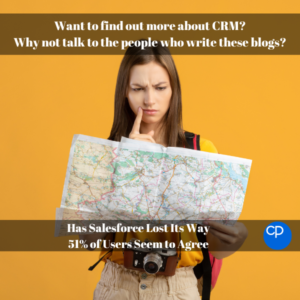 Cast your mind back to April 2022, Boris Johnson apologised for attending illegal party during lockdown, Australia signed ‘ground-breaking’ trade deal with India, astronomers discovered the most distant galaxy yet – and you’d be forgiven for missing this, Nucleus Research released a report titled ‘Salesforce, dream versus reality’.
Cast your mind back to April 2022, Boris Johnson apologised for attending illegal party during lockdown, Australia signed ‘ground-breaking’ trade deal with India, astronomers discovered the most distant galaxy yet – and you’d be forgiven for missing this, Nucleus Research released a report titled ‘Salesforce, dream versus reality’.
The tag line of which is – “A new study has called out industry giant Salesforce for decreasing value and customer satisfaction – and has concluded that it is no longer a leader in the CRM market.”
So, given that this is our bread and butter, we figured we’d add our thoughts to the discussion.
Why should you listen to us?
Well, Collier Pickard is a specialist CRM consultancy. We’ve been trading as Collier Pickard since 2004 and the company is managed by a core group of CRM experts who have worked together since the mid-1990s – with over 25 years of expertise in CRM, we have been here as this technology has evolved and matured.
We provide advice, guidance, implementation, best practice and long-term support for CRM and workflow management – spanning all aspects of CRM from marketing and sales, customer service and contact centres, web integration, back-office integration, and where necessary bespoke development.
We’ve worked with many of the key CRM providers like Microsoft Dynamics, Infor CRM (previously Sales Logix), Maximizer CRM, Creatio and more. While we are not a partner to Salesforce, in our consulting engagements we have recommended Salesforce in some situations.
We usually recommend Salesforce in cases where the client already has the product and has made a significant investment in configuration and integration but has overlooked the investment in training and culture change.
So, we’ve been there, walked the walk and written the book on CRM.
What is Salesforce?
Opening its doors in 1999, Salesforce got its start in the world of early CRM where competition was low, and CRM was still a brand-new phrase. So, you might already know that Salesforce is the big dog in the world of CRM, but how did it get there?
Let’s look at the numbers first:
- Salesforce’s annual revenue for 2022 was $26.492 billion
- In its 2022 Financial Year, Salesforce spent $11.85 billion on its Sales and Marketing
- 45% of their revenue
Salesforce spends a huge proportion of its revenue on sales and marketing efforts, and it has clearly paid off.
- As of 2020, Salesforce had 19.5% of the market share for the CRM space
- Oracle came second with 4.8% of the market share
So, we know that Salesforce is big, and we know that they spend a lot of money on putting themselves out there, but is the product any good?
Is the 600lb gorilla best for you?
If you look at their marketing, they have over 150,000 organisations using the cloud platform and they call it the best tool for small, medium, and enterprise firms. Sounds great right? According to the report from Nucleus Research, not quite.
Salesforce has grown spectacularly in the last 20 years, but recent research suggests that as it becomes the legacy client it is starting to suffer from the issues associated with being around for some time.
Salesforce shook up the market and rightly got to a dominant position, but the research suggests that their upgrade paths are nowhere near as simple as you would expect, and that the product once seen as a useful disruptor can now be a major disruptor of your upgrade processes.
Research from Nucleus suggests that customer satisfaction may be waning,
Salesforce, Dream Versus Reality
Over the last two years, Nucleus Research has gathered information from Salesforce customers and organisations that have switched to alternative solutions, as well as from clients of other CRM suppliers.
The report concluded that most organisations would be better served and would generate a higher return on investment by selecting one of the alternative market solutions in the face of declining value and customer satisfaction.
The Nucleus team ran a survey to gauge Salesforce users’ experiences as part of the research. This indicated that 51% of consumers said they would not repurchase Salesforce, and that the platform performs badly in terms of value and usability (requiring users to train on it more slowly than other top alternatives).
You can read the report for yourself by going to the Nucleus Research website here, but the key findings are as follows:
- 51% of Salesforce customers would switch to another CRM solution if given the opportunity
- On average, they achieved a positive ROI within 12 months of leaving Salesforce, making the cost of switching from Salesforce far lower than most customers anticipated
- 23% of Salesforce customers believe the value being delivered was diminishing relative to its cost and has fallen behind compared to the value delivered by its competitors
- Comparatively, fewer than 12% of Oracle users shared this same sentiment
- Salesforce is known for its aggressive growth initiatives, 20% per year, but customers feel that the support has not kept pace
- Compared to other leading vendors, the cost to implement Salesforce is notably higher, and Nucleus estimates that greater than 95% of Salesforce functionality is achievable through alternative vendors at fractions of the cost
How do I decide which CRM is best?
There are plenty of options when it comes to selecting a CRM platform, some of which consider themselves one-stop shops and others are more specialised, it can be extremely easy to get lost in the confusing CRM market.
Before you take the plunge into CRM you need to know what it is that you want to achieve from investing in a CRM system. We’ve created a checklist on the key steps that you need to take when investing in CRM which you can find here.
You might be looking for your own CRM and think that the market leader is a safe bet, yes, it’s more expensive, but 20% of the market can’t be wrong, right?
If you think that this may be a concern in your selection or renewal then we can be engaged to give you advice or, we also work with a couple of systems which we believe have the history to know what they are doing but have invested in re-writing their complete product from the underpinnings through to the user experience.
We have a library of content on selecting CRM from eBooks to articles. Alternatively, you can have a conversation with one of our experts and we’ll find the right system for you.




